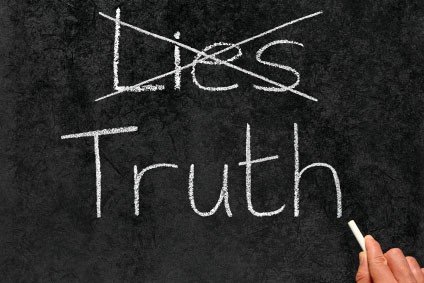To Tell the TRUTH...

By DON ESPOSITO
Right-click to download PDF version

Do you always tell the truth? Should you? Here’s how Yahweh’s Ninth Commandment applies in your life today.
Could a lie, even a “small” lie, ever be necessary or even justifiable? In this modern day of situation ethics, high-powered advertising hype, complicated interpersonal relationships and government cover-ups, a person might well be led to wonder!
Leading authorities condone, even encourage, at least “white lies” between husbands and wives, parents and children and other family members. Public officials hide wrongdoings in high places to “protect national security.”
Many of the fictional stories portrayed on television and in motion pictures are based on lies, all in the name of entertainment (much of it “comedy”) – and the more lies, the more interesting the plot, it seems. Advertisers have gone so far in their outrageous, and often downright untruthful, claims about goods and services that no wise consumer implicitly trusts any advertisement nowadays.
Gone are the days when having “the truth, the whole truth and nothing but the truth” was considered ideal. But is it always best to tell the truth? Is there any time at all that a lie would be better? Is honesty not always the best policy?
Here’s Yahweh’s strong answer: “And to all liars, their part will be in the Lake burning with fire and brimstone, which is the second death” (Rev 21:8)! To the carnal mind, this kind of reasoning is illogical. But from that perfect spiritual viewpoint upon which He bases His whole way of life, Yahweh commands us, “You shall not testify a witness of falsehood against your neighbor” (Exo 20:16).
The Ninth Commandment covers all aspects of lying – false accusations, pretentions, hypocrisy, half- truths, white lies, spreading rumors – even breaking promises. In fact, contrary to what some people think, there is no such thing as a white lie or a half-truth. A lie is a lie – and Yahweh hates it!
Half-truths
People often try to justify themselves by pretending that a half-truth is not a lie. They don’t realize that having only half the truth is still a full sin. The patriarch Abraham paid the consequences of such an experience. When he and his beautiful wife Sarai came to Egypt, he was afraid that the Egyptians would kill him in order to take Sarai for themselves. Abraham told Sarai, “Please say that you are my sister, so that it may be well with me for your sake, and my soul shall live because of you” (Gen 12:13).
Did Abraham lie? Yes. But wasn’t Sarai his half-sister? Indeed she was – but she was also his wife. Abraham had not told the entire truth. “And YAHWEH touched Pharaoh and his house with great plagues because of Sarai, Abram’s wife” (verse 17).
Do you sometimes utter half-truths, perhaps thinking that you are not breaking the Ninth Commandment? Most of us do, knowingly or unknowingly. It is not necessary to tell every detail of something you know – sometimes it’s best just to say nothing – but what you say must be the truth – the plain truth!
Shaded truths
One of the most important things to remember when you converse is that people don’t always hear what you want them to hear – not entirely. Your words don’t mean to them what they mean to you. Their ears only grasp what their minds are ready and willing to accept.
And when they repeat what was said, they shade the truth in a manner that paints them in a good light, just as you do. You only hear what you want to hear, and you repeat things in such a way that you appear innocent of any wrongdoing. We all have this tendency.
For instance, have you ever honestly examined how you describe an accident in which you were involved? Whose fault does it turn out to be?
That “innocent” little remark you make, the innuendo you add to your description, the manner in which you describe how it all happened, make a big difference. By shading the truth, you are actually telling a lie. Consider the way Eve answered Satan when Satan asked her what Yahweh had told her and Adam.
Yahweh had commanded: “Eating you may eat of every tree in the garden; but of the Tree of the Knowledge of Good and Evil you may not eat, for in the day that you eat of it, surely you shall die” (Gen 2:16-17).
Obviously, Eve was not pleased with Yahweh’s order. She wanted to have the right to freely take whatever fruits were in the Garden. Consequently, when repeating Yahweh’s order, she shaded it to her own advantage: She justified her own feelings, eager to find a way to show that Yahweh was selfish.
Eve told the serpent, “Of the fruit of the trees of the garden, We may eat, but of the fruit of the tree in the middle of the garden, Elohim has said, You shall not eat of it, nor shall you touch it, lest you die.” (Gen 3:2-3).
Check your Bible! Is that really what Yahweh told Adam? Read it for yourself. Did Yahweh forbid them to even touch the fruit? Did He say “lest you die” or “You shall surely die”?
People’s eagerness to defend themselves, to show the harshness of an order or an apparent injustice done to them, is what makes them shade the truth. And this happens more often than you might think.
A shaded truth is sometimes as far away from the truth as a blatant lie. The truth can be shaded by omission, addition or alteration, all of which deform the facts and change the truth into a lie. And remember, Yahweh hates lies!
Tale bearing
Do you repeat whatever you hear, whether good or bad, true or false? Yahweh said: “You shall not steal nor lie, nor deceive a man to another………….. You shall not go as a slanderer among your people; you shall not stand up against the blood of your neighbor” (Lev 19:11, 16).
When you spread rumors or act as a talebearer, you are breaking the Ninth Commandment. You cannot, as Yahweh commands, love your neighbor when you speak evil of him or make people turn against him. A true believer is a peacemaker, not a warmonger. Messiah warned, “It is impossible that the offenses should not come, but woe to him by whose hand they come!” (Luke 17:1).
A true believer speaks evil of no one. He does not judge or repeat things that can hurt his neighbor. Rumors, you surely know, spread rapidly. That is because Satan is eager to stir people up and cause strife. It is actually Satan who is the “accuser of our brethren” (Rev 12:10).
Notice this description of the kind of person Yahweh would want in His tabernacle or Kingdom: He who walks uprightly and works righteousness, and speaks the truth in his heart. He does not backbite with his tongue, nor does evil to his friend, nor lifts up a reproach against His neighbor” (Psa 15:1-3).
Do not break Yahweh’s Ninth Commandment by being a talebearer. Yahweh hates lips that spread rumors.
Bearing false witness
When you are called upon to be a witness, you are shouldering a most important responsibility. By your own words, an innocent party may be condemned, or a criminal may go free.
Are you a true witness or a false witness? Do you report facts accurately, or do you distort them and take sides? A true believer is not a respecter of persons. However, the tendency is to twist a story, especially if one’s own interest is involved.
Yahweh says, “A false witness shall not be blameless; yea, a breather of lies shall not escape” (Prov 19:5). None of those who persecuted Messiah could find anything wrong with Him. Nevertheless, they constantly accused Him of wrongdoing. They criticized His words and actions. They even bribed people to utter lies about Him, in order to condemn Him. And their ugly conspiracy did not even end at His death – they employed false witnesses to lie about the miracle of Messiah’s resurrection, too (Mat 27:62-66, 28:1-15).
Ask Yahweh daily to help you tell the truth no matter what the price or the circumstances. If you are given the task of being a witness, always tell the truth, even if it hurts you or works out to your detriment. Be a true disciple, a faithful witness – seek to please Yahweh, not men!
Hypocrisy
Hypocrisy is another facet of lying – of breaking the Ninth Commandment. A hypocrite says one thing and does another.
For example, the scribes and Pharisees of Yahshua’s day considered themselves to be righteous and holy, but the truth was that their righteousness was in appearance only. They cleansed “the outside of the cup and of the dish, but within they are full of extortion and iniquity” (Mat 23:25).
That’s why Messiah said: “Then all things, whatever he (Moses) tells you to keep, keep and do. But do not do according to their (Scribes & Pharisees) works, for they talk, and do not do” (verse 3).
Another example of hypocrisy is that of Ananias and Sapphira. They pretended to share share their goods with Yahweh’s people, but their apparent generosity was merely a public show. After selling their land for a given price, they pretended to lay the total purchase price at the apostles’ feet, but they actually kept back a portion of it for themselves. The result? They paid with their lives for their lie (Acts 5:1-10)!
Hypocrites pretend to be something they aren’t, or to do something they don’t.
Abhor lying
Lies, hypocrisies and false pretentions have no place in the mind or actions of a true disciple. Do they in yours? And what about the promises you make? Do you keep them? Do you perhaps think that breaking a promise is not a sin? Believe it or not, it does violate the Ninth Commandment!
David said, “I hate and despise lying; but I love Your Torah” (Psa 119:163). What a beautiful statement – what a beautiful attitude! It is no wonder that David was a man after Yahweh’s own heart.
Do you want to be a disciple after Yahweh’s own heart? If so, hate and abhor lying, and love Yahweh’s commandments – including the Ninth!